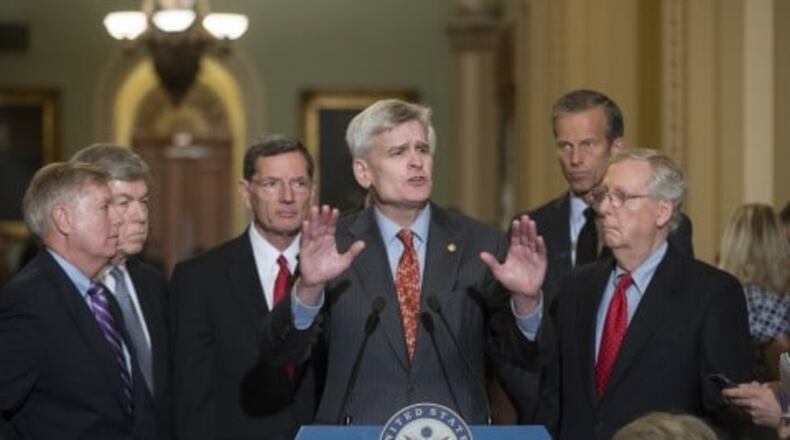A significant majority of Americans now view health care as a right that ought to be available to all, not as a commodity that ought to be rationed by the marketplace so that some cannot afford it. And that changes everything.
It explains, for example, why the Republican Party finds itself stuck in a pickle barrel, unable to escape. In terms of policy, they stubbornly refuse to recognize that fundamental transformation in public attitude. Every bill they draft, every policy they promote represents an effort to return to the old model in which health care is rationed by cost, given to those who can afford it and withheld from those who cannot.
That's unpopular, and they know it. They know it comes across as mean and cruel, because it is. But rather than go through the wrenching process of updating their policies to adjust to that change, they've decided it's easier to just change their marketing. Their solution has been to push the same old proposals, but to lie about their impact and intent.
So over the last few weeks, every time the TV cameras pointed in their direction, Senate Republicans would solemnly promise that their latest health-care proposal would increase, not decrease, the number of Americans with health insurance. They couldn't explain how, but they kept insisting it was true.
Not true, said the Congressional Budget Office this week. Noting that its typical in-depth analysis was impossible because Republicans were trying to rush their bill through, CBO could say only that the "direction of the effect is clear," with the number of insured "reduced by millions" under the Graham-Cassidy bill. (CBO estimates of previous GOP bills put the number of additional uninsured at 20 million to 30 million.)
In addition, President Trump, Sen. Bill Cassidy, Sen. Lindsey Graham and other Republicans practically swore on their mothers' graves that their bill would not end protections for those with pre-existing conditions. Well, their mothers have every right to be upset with them, because their sons lied, point-blank.
The CBO analysis makes clear that under Graham-Cassidy, states would have the authority to end protections covering pre-existing conditions. More importantly, the CBO warns that the economics of the Graham-Cassidy bill would pretty much force states to take that step.
The alternative would be the dreaded death spiral:
"Without subsidies — and with insurers required to accept enrollees having preexisting health conditions and with premiums varying only by age, geography, and smoking status — premiums would be high, and few people would enroll. Not only would enrollment decline, but the people most likely to remain enrolled would tend to be less healthy (as they would be more willing to pay higher premiums). Thus, average health care costs among the people retaining coverage would be higher, and insurers would have to raise premiums in the nongroup market to cover those higher costs. Anticipating such an unsustainable spiral, some insurers would not participate in the nongroup market .... over time, fewer and fewer insurers would continue to offer insurance."
That is, by any definition, a policy failure. It is also a marketing failure, because thanks to these last nine months the American people now understand how bankrupt of ideas the GOP has become. In a CBS poll released Monday, just 20 percent say they back the GOP's bill. They recognize, even if the GOP does not, that the debate over the goal of universal health care has ended, and the debate over how best to achieve it must begin.
About the Author
The Latest
Featured



